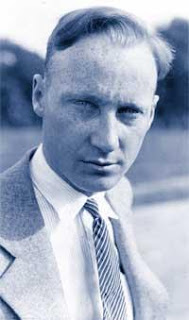Sunday, May 25, 2008
Remembrance of Things Not Past
 On May 25, 1925, John Scopes was indicted for teaching Darwin's theory of evolution.
On May 25, 1925, John Scopes was indicted for teaching Darwin's theory of evolution.As this 1961 article by G.G. Simpson makes clear, not much has changed over the years since the trial:
We are all familiar with the Scopes trial, if only from being reminded by the stage and movie success, Inherit the Wind. Many people seem to consider it as a quaint and amusing bit of ancient history that occurred in one isolated backwoods community. The fact is today that there are innumerable towns and whole cities that are just as opposed as Dayton, Tennessee, was to the teaching of evolution. And they are more successful in preventing it. ...
What was actually argued in court, by prosecution and defense alike, was not the guilt or innocence of the defendant but the truth or falsity of evolution. There was, indeed, a social issue that transcended the rather trivial legal one. But certainly that really fundamental social issue was neither Scopes's guilt nor the truth of evolution. It was the competence of a legislature to enact and of a court to enforce the prohibition of teaching a theory that, whether true or not, was sustained by a large number of respectable scientists certainly competent in the pertinent field. By submitting the question of the truth of evolution to the court and jury, the defense equally with the prosecution compromised the whole situation and lost the one essential point. The point would have been the same if the law had made the teaching of evolution obligatory and Scopes had refused to teach it. Legislatures, judges, and juries cannot decide the correctness of a scientific theory or of the results of any scientific investigation. That can only be decided by further research in the self-correcting style of science. ...
Laws against teaching evolution are still nominally in effect over wide areas of the United States, but there has been no recent effort to enforce them. The prohibition is nevertheless now being applied far more effectively than by law and through agencies that are equally incompetent. ...
[A] proposed, and actually used, solution is to present both sides of the case. Teach evolution under its own name as something that certain authorities believe. Also teach that certain other authorities do not believe it, and let the student decide for himself (or ignore the whole thing). This was hailed by some teachers ... as the most 'honest' compromise on the problem, but I am afraid I cannot agree. It is less honest -- because the student is less able to judge from data in his own hands -- than teaching that some people say the earth is flat and some say it is round. It would be honest only if the teacher pointed out that the authorities who 'believe' in evolution ('believe' is a misleading word here, too) are, almost to a man, those who have actually studied the subject in a scientific way and that those who do not believe in it are, almost to a man, obviously ignorant of the scientific evidence and swayed by wholly nonscientific considerations.
- George Gaylord Simpson, "One hundred years without Darwin are enough," Teachers College Record, 60 (1961): 617-626
__________________________
Which is as good an excuse as any to remind people of the series that I did last year on the trial, that you can find here.
.
<< Home





